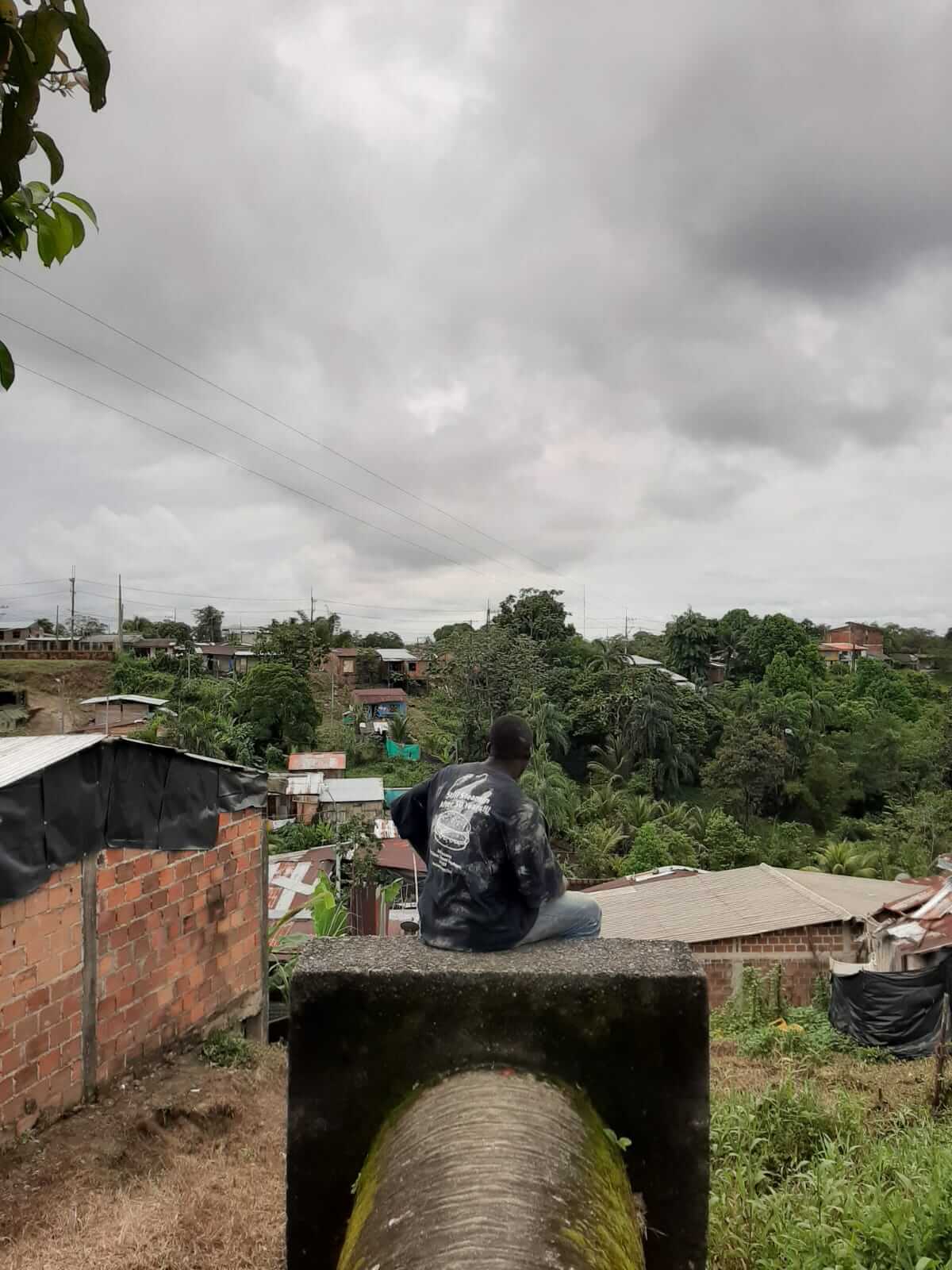Leaky Pipes. State and Infrastructural Violence in the Colombian Frontier
Felipe FernándezDecember 12, 2022 | Projects

Yeison sitting on a Pipe. Photo by the author.
Buenaventura is located in the Pacific region, an internal frontier of the Colombian nation-state (Serje 2005). Since Spanish Colonial times, these frontiers have been imagined as no-man’s-land, as spaces of unruliness and savagery. In fact, the Pacific region was never included into the national project and remained on the (material, bureaucratic and discursive) margins of the state. Exploitation of resources, such as gold and timber, were carried out by means of an enclave economy. Slaved subjects were brought from Africa to the Colombian Pacific and served as labor force until abolition in 1851. Nowadays, the region is deemed by the state as a buffer for environmental protection and biodiversity. But drugs and illegality had poured into the territory: violence has caused mass displacement and people are now concentrated in the urban centers such as Buenaventura. Here, another enclave has been established: the port, the one of logistics which support and foster global trade and capital while Afro-Colombians remain marginalized and are widely expelled from urban development plans.
The 430 000 inhabitants-city has one of the highest rates of poverty, unemployment, and violence in Colombia. Since the 1990s, things have rapidly worsened due to the ways of privatization and the pouring of the armed conflict into the region. Thousands of people have been forcibly displaced from the rural areas and had to move to cities such as Buenaventura. Urbanization unfolds in irregular ways, and public investments are low. Thus, precarious urban environments proliferate while the port economies grow. Despite the myriad of water sources surrounding Buenaventura in form of rivers with stunning purity levels, the supply is highly deficient due to ageing infrastructures and a weak infrastructural framework.
Water pipes in Buenaventura are extensively leaky. Leakages are holes, fissures, cracks, caused mainly by accident, that is, by unstable topologies, by the weather or by ageing materials. There are many, and they are extremely difficult to measure and repair (Anand 2015). Some people access water through improvised, ‘illicit’ connections, causing leaks unintentionally. Water pours out from the gap between the hose and the bore, generating losses. Indeed, leaks lead to “unknown and uncontrolled flows of water” in the city, making the aqueduct difficult to govern (Ibid., 308). However, most of the leaks are caused by state negligence, that is, scarce maintenance. Leakages “depress” the system, an engineer working for the municipality in Buenaventura told me during a meeting. The term is borrowed from the medical jargon, meaning that the pressure needed to provision all supply pipes is insufficient. Consequently, water flows must be sectorized using valves, which limits water supply to a few hours a day (six, in average). A water schedule – only that way the necessary pressure in the system can be guaranteed. Usually, people know when water is ‘coming’ to their neighborhood. However, this flow can vary, and water can be ‘gone’ for days. Uncertain flows thus alter and define urban everyday life.
Recently, a state-led development project called Plan Todos Somos PAZcífico (PTSP) intended to improve the water infrastructure. While the state reaffirms its efforts to build and expand water infrastructures with reference to the project and its different forms of representation (through discourses, images, objects and laws), in fact, a proper water supply, the main goal and promise of the project, is still far from being realized by now. Drawing on the concept of ‘complying incompliantly’ (Pellegrino 2022), I argue that this deferral and partial failure of the project responds to a mechanism through which the state apparatus pretends to fulfill its responsibility while, at the same time, failing to comply to its stated goals.
This and other forms of ‘organized abandonment’ (Goldstein 2012) of urban infrastructures by means of underinvestment and neglect, I argue, resulted in institutional weakness and a massive deterioration of the pipelines, the water tanks, and the operation of the water supply system itself. I further stress that the brutality that has constituted the Colombian frontier is maintained and reproduced not merely in everyday forms of physical violence, but also in forms of (infra)structural violence. As scholarly literature has argued, the deficient provision of public goods to certain populations leads to premature death, precarious citizenship, and the unfolding of everyday survival practices (Appel et al. 2018; Anand 2017). The crumbling infrastructures for water supply in Buenaventura fuel and reproduce imaginations and mechanisms of power in the internal frontier.
Felipe Fernández is a postdoctoral research fellow at the Institute for Latin American Studies at the Freie Universität Berlin. This blog post is based on his doctoral thesis on violence and water infrastructures in Colombia.
Published: 12/12/2022
